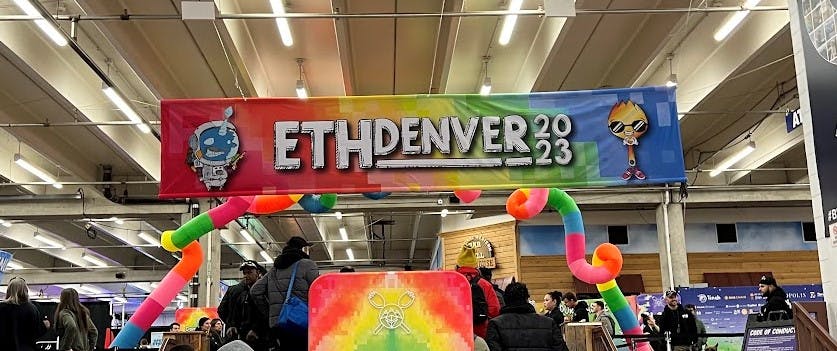
My first ETHDenver: a retrospective
On the state of web3, IRL interactions, and post-ETHDenver blues

I’m a little late to the party, but I wanted to write a little about my first ETHDenver (and crypto conference) ever! I flew in Wednesday and left on Saturday, and the whole experience was 4 days of nonstop events, meeting people, and learning about new protocols and companies.
A few of my big takeaways…
Even in a bear market, web3 is alive and well for crypto-natives.
We still have a ways to go to make web3 understandable and appealing to the vast majority of people. I had multiple Uber drivers who either didn’t know that ETHDenver was happening at all or thought I was going to a Bitcoin conference.
But for crypto-natives, the use cases and opportunity seem to be endless. There was a lot of buzz about innovation in the space — I heard many conversations about scaling with L2s, account abstraction and EIP-4337, and the future of DAOs. I also got the sense that in the long-term, these changes and conversations would make web3 a better experience for everyone.
There were so many talks at ETHDenver, and I attended two talks that really stood out to me. The first was Kevin Owocki’s talk “New Form Factors for Quadratic Funding” at Schelling Point.

A lot of the thesis of this talk is in this forum post, and the social network application of quadratic funding really resonated. I’d heard a lot about quadratic funding in association with Gitcoin Grants, but hadn’t really considered how the mechanism could be applied for other use cases. This isn’t exactly the same as microtips, but I have enjoyed collecting open editions, whether that’s art or content NFTs. These are often free or low cost mints that I typically mint to signal participation and interest in something, whereas for higher cost mints I’d probably spend more time considering utility. Microtips strike an interesting balance between measuring how people value content by introducing real, monetary stakes while still remaining accessible enough for people to participate in the network.
The second talk was a panel, “Scaling Ethereum for Global Adoption with L2” featuring Eva Beylin, Liam Horne, Molly Mackinlay, Jesse Pollak, and Stani Kulechov.
There were a couple key insights that I heard during this panel. First was a discussion on what has made it possible to scale Ethereum — low enough fees on L2s, improved wallet UX, and account abstraction, as well as commentary on L2 interoperability and security concerns. A lot of the panel discussed concepts that I was tangentially familiar with, but my biggest takeaway from this panel was that L2 infrastructure and scalability are super interesting problems and I want to learn more about this area of web3!
I also wanted to learn more about Optimism/OP Labs, since my college’s blockchain club was selected to become an Optimism delegate by a16z. Hearing about the OP Stack was interesting, and I thought the discussion on Coinbase’s approach to decentralization through Base was insightful as well.
IRL interactions
Meeting people in-person is awesome! There’s a synergy when you’re talking face-to-face with someone that can’t be replicated online, and I really leaned into the spontaneity of conversations and networking during the week.
I met many wonderful people, including finally meeting Mari, Merve, and Nima from the Women in Web3 team, Frisson and Tommy from Tally, and Diana from Rehash in-person. I also had amazing conversations with new friends at the Boys Club, Variant Fund, SheFi, and Farcaster events (shoutout to Jamie, who I saw at pretty much all these events!).
It was very surreal to run into people, introduce myself, and have them recognize me from Twitter, or Article Club, or some other avenue. I was really intimidated by approaching people a lot of the time, but I’m really glad I did.

The post-ETHDenver blues
Like many people, I got sick after ETHDenver, and therefore had a lot of time to think about what I wanted to take away from this experience while going through bags of cough drops and cups of tea. The main thing is that there is so much in web3 that I don’t know about and want to dive deeper into — big areas that piqued my interest included L2 infrastructure and understanding more about practical decentralization for DAOs. The conference could be overwhelming at times because I didn’t have a specific focus or goal in mind. I was talking with everyone and learning about everything, and I think that was great for my first conference but likely less ideal in the future.
On the people side of things, everyone I met was kind and generous with their time and energy. It was especially awesome to meet people that I had already interacted with online, and I gained a better understanding of the web3 community at large.
The next time I go to ETHDenver, I’ll be a lot more prepared for what to expect and set goals for the conference ahead of time. But until then, goodbye for now ETHDenver!
If you enjoyed reading this, subscribe for more posts and to support my work!